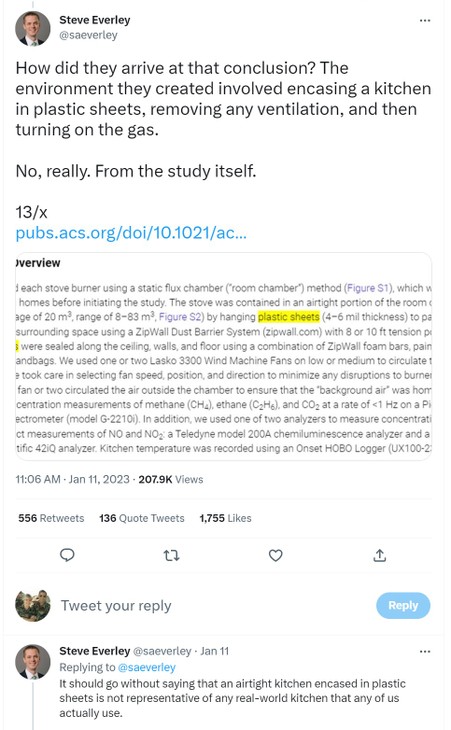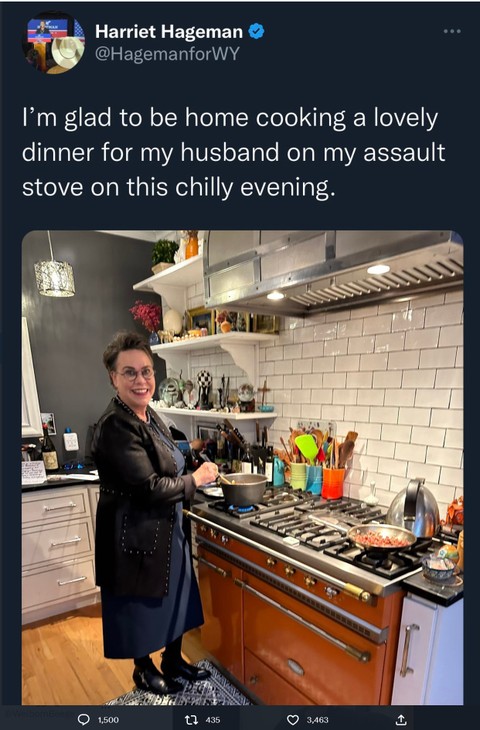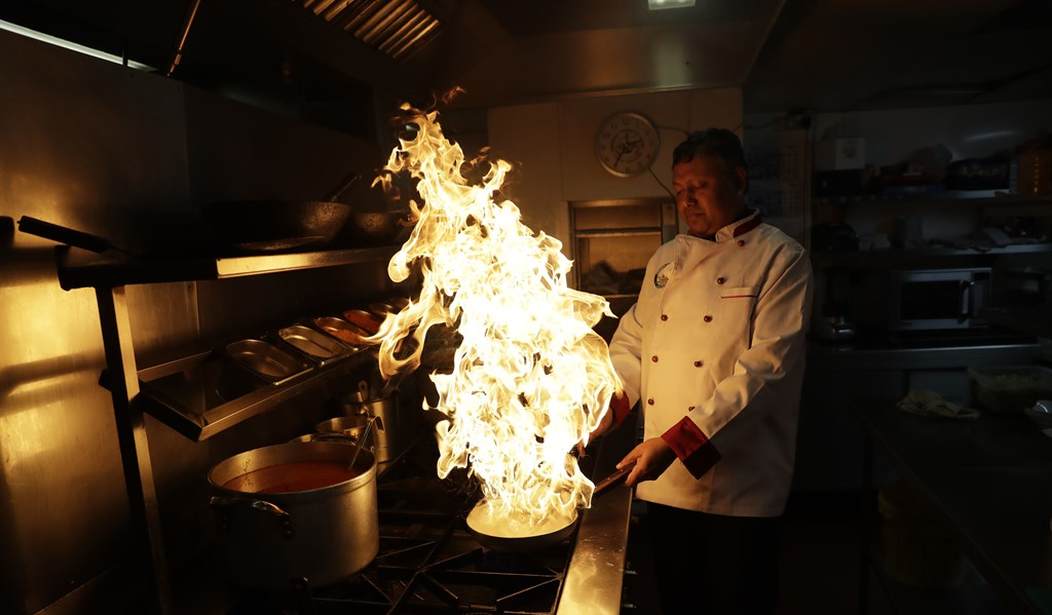This is just a friendly warning as the uproar from the proposed grab-for-your-gas-stove has subsided somewhat:
Don’t fall for the lyin’ Trumka in your tailpipe joke. They’re still coming for it.
The first clue is the kinder, gentler puff pieces appearing in the op-ed sections of the usual suspects. They pooh-pooh sane people’s dismissal of the recent, pretty thoroughly debunked BOMBSHELL STUDY. You know. The one where they measured all these horrific toxic chemicals flooding the air while cooking on gas stoves…in kitchens encased in sheets of plastic sealed with dust-proof ZipWall barriers?

Yeah. That’s the one.
Not surprisingly, the New York Times has jumped on the “simmer down” bandwagon. Quit trying to deny they’re bad for you and Mother Gaia. Let us lead you to the wonderful world of induction!
Silly Righties – this won’t hurt a bit.
Is the Era of Gas Stoves Burning Out?
Earlier this month, a commissioner of the United States Consumer Product Safety Commission, the nation’s top consumer watchdog, said that the agency was considering new regulations on gas stoves, including a ban, because of a growing body of research linking them to hazardous levels of indoor air pollution.
The suggestion ignited a furor, particularly on the right. “If the maniacs in the White House come for my stove,” Ronny Jackson, a Republican congressman from Texas, tweeted, “they can pry it from my cold dead hands.”
…The case for simmering down
Induction technology has been around for decades, but only 3 percent of American homes have it, according to a 2022 Consumer Reports survey.Ignorance of its advantages could be one reason for the low uptake, but so could knowledge of its drawbacks. Induction technology works only with cookware whose exterior is made of magnetic metal, excluding bare or anodized aluminum, copper and some stainless steels. While their prices continue to drop, induction ranges also cost more on average than gas ones, and that’s without accounting for any electrical work that might be needed for a conversion.
Induction “prices continue to drop/cost more on average“?
This is like Biden telling people who own a ’96 Camry (like us) to “shut up and buy the Tesla, you Luddites!” Induction is a YOWSAHS sight more expensive than a gas stove (remember – it’s only a cooktop, so you’ll need to purchase a separate oven if you have a range)…
…Induction stovetops are significantly more expensive, averaging $3,000 and up, according to Angi, the home-services company. Rebates up to $840 may be available to some home chefs who convert to electric under the Inflation Reduction Act later this year.
…and only certain cookware will work. You’d have to – probably – buy all new very specific stuff.
Cha – CHING again.
Now, I have 40 years of collected pans and pots, some of which are close to 100 years old, and my gas range does not discriminate. It welcomes all comers. I like that and will continue to stuff my cabinets with ancient cast iron, RevereWare, and tonnage of LeCreuset.
The appeal to my nobler sense is wasted when it comes to my gas stove – heck, my natural gas house, period. (Sorry, Pravda NYT.)

But these kinds of nudges are only the softer edge of what’s going on behind the curtain. I remember being so disappointed, after 12 years of a gas stove in California, when we transferred to Jacksonville, North Carolina. Everything was all-electric. Not only did it stink cooking on it, but it also ate you alive (even in the early 90s) with the cost per KWH, and we were on one of CP&L’s programs where you saved a bit if you kept your power usage under certain parameters during peak hours.
I am convinced to this day that the heat pump was the spawn of Satan.
There were rumors of a nat gas pipeline being planned to run into the state and, eventually, the coastal counties. In 2020, that came to a crashing halt with the cancellation of the Atlantic Coast Pipeline, and environmentalists were thrilled. N.C. now has gone so far to the left, their state renewable plan is dictating all-electric homes. Nat gas has no place in their future (As I explained in this post on the Christmas blackouts.) and more’s the pity. What short-sighted, self-destructive foolishness.
New York’s legislature and daffy governor are catching all sorts of heat for their proposed state-wide ban on nat gas. Clueless Gov Kathy Hochul really stepped in it for talking out of both sides of her mouth when pushing for the ban while cooking on gas at the governor’s mansion.
Them and us, people. There’s them and us.
Gov. Hochul wants to start banning gas stoves in new homes by 2025 – but critics say she’s full of hot air.
The pushback is targeting Hochul’s personal use of fossil fuels on gas ranges at the Executive Mansion in Albany and at her private pad in Buffalo.
“The governor’s push to ban gas stoves appears to be as hypocritical as it is ridiculous,” Assembly Minority Leader William Barclay (R-Fulton) fumed.
“One has to wonder how many times she’s fired up her own gas stove since declaring them environmentally unsafe in her State of the State Address,” he added.
…“If eliminating natural gas appliances and heating isn’t a priority for the political elite then why should it be for middle-class families in New York,” he [ state Sen. George Borello (R-Jamestown)] asked.
San Diego has already taken it to the extreme. Their ban is in place, and, man – is it ever gonna cost you.
San Diego is moving ahead with a full-on natural gas stove ban.
By 2033, all gas stoves will have to be retrofitted – costing the tax payer $30,000 per home. pic.twitter.com/AYTANJJpio
— Citizen Free Press (@CitizenFreePres) January 19, 2023
Kimberly Strassel has a great piece in the Wall Street Journal today about all the different groups working under the radar to yank that wonderful appliance and the fuel that runs it right out of your hot little hands. It is absolutely maddening.
…The reason gas stoves are in the news is simple: There is a coordinated, calculated—and well-funded—strategy to kill them off. It’s the joint enterprise of extremely powerful climate groups, working with Biden administration officials who have publicly stated their aim to eliminate all “combustion appliances” in homes. Only after the GOP called them out did anyone pretend otherwise.
Some of this is being exposed in letters sent this week by Senate Commerce Committee ranking member Ted Cruz to CPSC commissioners demanding more information. The letters highlight the primary groups behind this push. One is the Climate Imperative Foundation, which became an overnight green powerhouse and reported more receipts in 2021 than the League of Conservation Voters or the Sierra Club. A board member and funder is Kleiner Perkins billionaire John Doerr, whose climate action plan calls for getting rid of gas cooking. CIF’s executive director, Bruce Nilles, has made the end of gas stoves an imperative, writing in 2019: “Your gas stove has to go.” CIF has granted money to the Rocky Mountain Institute, which has long advocated “retrofitting” existing homes to be “all electric.”
…The stated goal of all these group is killing gas to “save” the planet. Yet they also know Americans won’t give up their stoves in the name of climate. So several years ago this cabal hit on the idea of contradicting decades of science and ginning up hokey studies claiming gas stoves present a “health risk.” The twin goals: scare Americans and give government a pretext to ban gas cooking.
Case in point? The gas stove in plastic kitchen tents “study.” The author of that was a consultant, not a scientist, and an industry consultant to boot. Hardly an unbiased investigator with a disinterested position on the outcome (And talk about rigging that outcome!).
Can I keep my gas stove now?????😂😂😂😂😂😂😂😂 pic.twitter.com/Um26Z23WYu
— Tina Brown (@tinabrown980) January 24, 2023
It makes you wonder what’s going to happen in the real estate market, for one. Is there going to be pressure on agencies to start using earth-friendly language to sell one home over another? Right now, nat gas has the clear advantage.
If You Want to Sell a Home, Put Gas Stove in the Listing
Most Americans cook using electric ranges, yet many see gas as a premium featureOn the question of which type of stove is best for your open house, real-estate agents say there is a clear winner: Gas fuels home sales.
Home buyers prefer gas ranges because they say food cooked over flames heats more evenly and tastes better than when done on a traditional electric stove, said Damien Rance, a Realtor in Weehawken, N.J. A gas range may slightly boost a home’s value, especially if the stove’s overhead exhaust vents, said Realtors from across the country.
“Gas is still seen as a premium offering in homes,” said Mark Barnes, a Realtor in Charleston, S.C.
Get it while you can, and don’t let go of it without a fight, which includes the statehouse and the White House if need be.








Join the conversation as a VIP Member